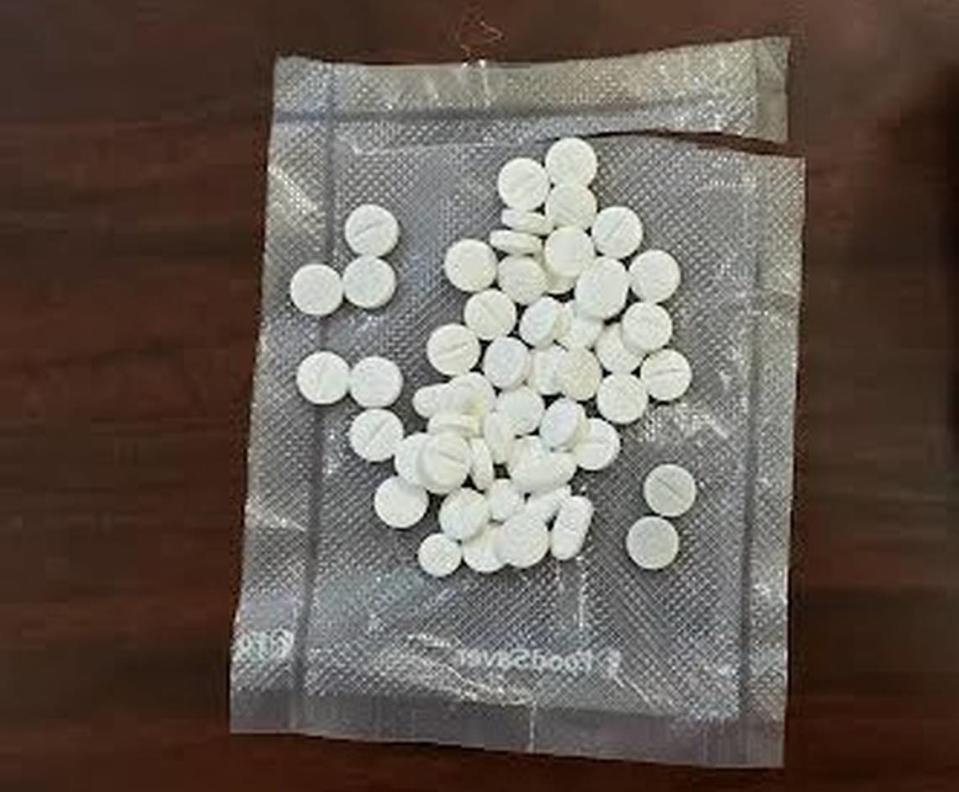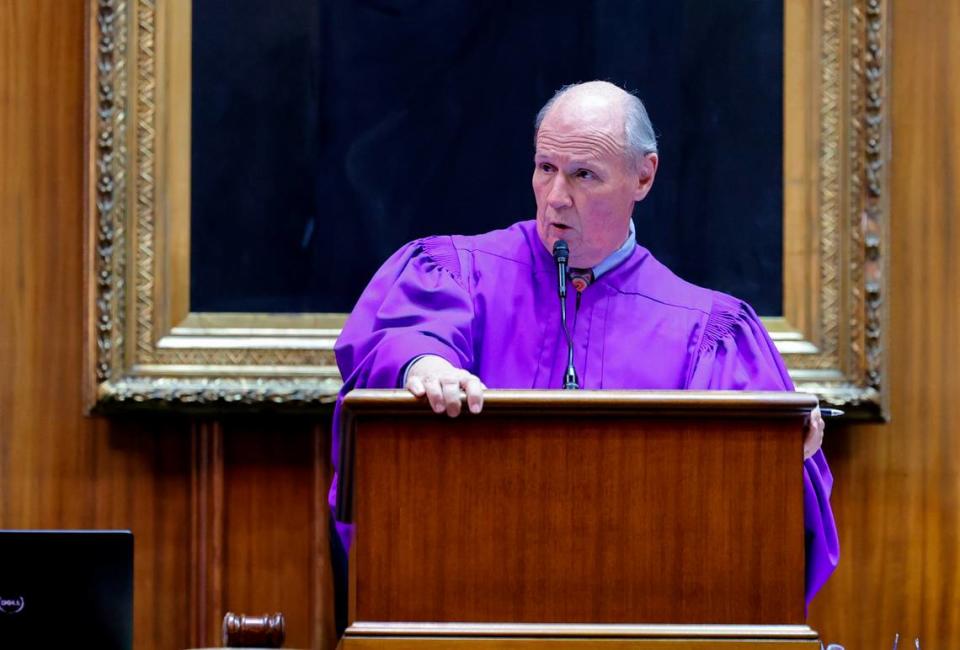As fentanyl overdose deaths rise, SC lawmakers consider homicide charges for suppliers
Drug overdose deaths in South Carolina and across the country have soared since the pandemic, and a single substance is largely to blame.
Fentanyl, a synthetic opioid up to 50 times stronger than heroin, now accounts for the majority of drug overdose deaths in South Carolina, according to the most recent state health department data.
Fentanyl-related deaths in South Carolina more than doubled between 2019 and 2020, spiking from 537 to 1,100, and state officials who have reviewed preliminary 2021 data say the number of deaths has continued to climb.
“More and more illicit substances are laced with fentanyl, and fentanyl is just so potent that very small amounts of it can cause respiratory depression — make you stop breathing,” said Brannon Traxler, South Carolina’s public health director. “It does not take much to make that happen and, unfortunately, that leads to death pretty quickly.”
Many states have responded to the recent rise in opioid overdose deaths by enacting tougher, fentanyl-specific drug penalties, but South Carolina has yet to do so, despite apparent widespread support for them among lawmakers.
Senate President Thomas Alexander, R-Oconee, who has sponsored fentanyl-related bills each of the past two legislative sessions, blamed timing for the General Assembly’s failure to pass the legislation.
He recently reintroduced a fentanyl-specific drug-induced homicide bill that passed the Senate unanimously last year, and said he’s hopeful it will become law in 2023. Drug-induced homicide laws, which are on the books in roughly two-dozen states, allow prosecutors to charge drug suppliers in fatal overdoses.
A similar fentanyl-specific drug-induced homicide bill has been introduced in the House, and lawmakers in both chambers have filed bills before the Jan. 10 legislative session that criminalize fentanyl trafficking to close what some describe as a “loophole” that prevents dealers from facing more than drug possession charges.
“It’s unfortunate the tragedy of lives that are being lost and families that are being impacted,” Alexander said. “The best course of action is to prevent the deaths, and No. 2 is giving law enforcement as much support and the tools to address it once it’s happening.”
While advocates of drug-induced homicide prosecutions appeal to the need to punish dealers who callously endanger the lives of drug users to turn a buck, critics of the laws argue the issue is far more nuanced. The line between dealers and users is often fuzzy, they say, and the laws frequently end up being applied in unintended ways.

What would the bills do?
Alexander’s bill and a virtually identical bill proposed by former solicitor and House Speaker Pro Tempore Tommy Pope, R-York, and others would create the felony offense of fentanyl-induced homicide.
Under the proposal, which passed the Senate 42-0 last year, someone who “unlawfully delivers, dispenses or otherwise provides fentanyl” that causes another person’s death is guilty of fentanyl-induced homicide. A fentanyl-induced homicide conviction would put someone away for up to 30 years, but carries no minimum sentence.
State Sens. Brian Adams, R-Berkeley, and Penry Gustafson, R-Kershaw, have filed a slightly broader drug-induced homicide bill that applies to all controlled substances, not just fentanyl, and carries a 15-year mandatory minimum sentence, which the S.C. Attorney General’s office and State Law Enforcement Division have said is necessary as a deterrent.
Adams, a former North Charleston police officer, said his own experience leading a narcotics and street crime unit motivated him to file the bill.
It was frustrating to know a dealer had sold someone a lethal dose of drugs but be unable to charge them for it, he said.
Adams sometimes brought fatal overdose cases to federal law enforcement, he said, but their heavy caseloads and the complicated nature of proving drug-induced homicide charges often precluded the Drug Enforcement Agency from pursuing them.
To convict a dealer, police often must connect them to victims through text messages or witnesses who saw them together or bought drugs from them at the same time, Adams said.
“You have to have all the pieces in place in order to take them to trial,” he said. “(Dealers) are not there most of the time when the overdose occurs … so putting them in a position to where they’re responsible for that death is a hard case.”
Whether it’s his bill or Alexander’s that lawmakers ultimately settle on, the Berkeley Republican said the time is ripe for South Carolina to pass fentanyl-related legislation.
“I think this is a great year for these bills,” said Adams, pointing to the increased public focus being paid to fentanyl. “With any luck that’ll get them across the finish line.”
Alexander agreed that there was broad bipartisan support for passing fentanyl-related legislation and said he sensed it would be a priority for lawmakers in the coming session.
“Support has grown rather than lessened,” he said. “So certainly, I would be hopeful it’ll be something we address sooner rather than later.”

The case for and against
Supporters of enacting a drug-induced homicide law in South Carolina point to the need to punish dealers who are “peddling poison” to often unsuspecting drug users.
People seeking out other less potent drugs are increasingly being sold those drugs laced with fentanyl, or in some cases, straight fentanyl, public health and law enforcement officials said.
“We’re seeing more people dying of co-occurring drugs, like meth laced with fentanyl, cocaine laced with fentanyl and heroin laced with fentanyl,” SLED Narcotics Major Frank O’Neal said. “If you’re a drug dealer and you’re selling cocaine or you’re selling meth and you can make more profit selling fentanyl, you’re going to switch to fentanyl and try to get more people addicted to more drugs.”
While some users actively seek out fentanyl for the intense high it provides, many ingest it unknowingly, he said.
The heartbreaking stories supporters of drug-induced homicide laws recount when advocating for their passage often involve young adults who overdosed on drugs they were unaware had been laced with fentanyl.
Enacting laws that hold fentanyl dealers responsible for the deaths they cause is of paramount importance, advocates say.
“We’re letting drug dealers basically give the death penalty to our people,” 7th Circuit Solicitor Barry Barnette testified last year during a Senate subcommittee hearing on drug-induced homicide legislation. “And I can’t implore you enough to give us these weapons, because … right now we don’t have the tools to try to combat this.”
Critics of the laws, however, argue they’re counterproductive because they fail to deter dealers while often ensnaring the friends or partners of overdose victims.
Fair and Just Prosecution, an organization of past and present prosecutors that advocates for prevention-oriented and community-focused justice reforms, earlier this year issued a white paper highly critical of drug-induced homicide prosecutions.
The group argued such prosecutions actually exacerbate the risk of fatal overdoses, fail to reduce the supply of, or demand for, drugs and rarely bring down the drug kingpins they’re intended to target.
An analysis of several states that actively prosecute drug-induced homicide cases found they experienced “significant” increases in overdose deaths, according to the brief, which attributes the spikes to drug users’ reluctance to seek medical attention due to fear of arrest.
While many states, including South Carolina, have Good Samaritan laws that afford immunity from prosecution to people who call 911 to report an overdose emergency, most states only extend that immunity to low-level drug offenses.
A person who seeks medical help in the event of a fatal overdose can still face drug-induced homicide charges in the vast majority of states with such laws, according to Fair and Just Prosecution.
That matters, the group says, because illicit drug use often occurs in peer groups, where the line between users and dealers is blurred. If a group of friends pools its money to buy drugs to share and one of them overdoses, the friend who purchased the drugs could face drug-induced homicide charges.
A national study of media reports about drug-induced homicide prosecutions between 2000 and 2017 found that roughly half of those charged were social contacts of the deceased, not traditional dealers. In some jurisdictions, friends or relatives of overdose victims made up 80% to 90% of those charged in their deaths, studies have found.
It’s far easier to make charges stick against someone present at the scene — often a friend or partner who provided the drugs or even shared the drugs with the victim — rather than go after drug dealers two or three steps removed from the situation, Fair and Just Prosecution’s brief asserts.
“As these analyses make clear,” the organization wrote, “(drug-induced homicide) laws consistently fail to live up to their legislative intent, and instead simply deepen cycles of harm and trauma by ensnaring the loved ones of the deceased in the criminal legal system.”
While none of the drug-induced homicide bills introduced in South Carolina provide immunity to people who call 911 when a companion overdoses, Alexander and Adams both expressed openness to adding such protections.
Adams said he’d heard of situations in other states where non-dealers had been charged with drug-induced homicide and supported expanding the state’s Good Samaritan law if it encouraged more people to seek medical assistance in overdose situations.
“I’m pretty sure that’s going to be an amendment, and if not, I’ll probably add it because I agree with it,” he said. “If that can save a life then I don’t have a problem with that.”
Sara Goldsby, director of the South Carolina Department of Alcohol and Other Drug Abuse Services, declined to weigh in on any of the proposed drug-induced homicide legislation, but said the agency generally supports treatment, rather than criminalization, for people with substance use disorders.
“We really don’t believe that people who are sick should be criminalized because substance use disorder is not a moral failing,” she said. “It is an illness that too often goes untreated.”
Goldsby added that while there remains a need for law enforcement to pursue traditional drug dealers and traffickers, drug policy should be carefully considered.
“There’s a lot of nuance and dynamics to these situations and we should just be very careful not to use a blunt instrument on issues that can be detrimental to people’s health and lives,” she said.
If you or a friend or family member need help with substance abuse, Goldsby recommends visiting the agency’s Just Plan Killers website. The site has an interactive map of opioid treatment centers across the state and information about obtaining the opioid reversal drug naloxone free of charge.

